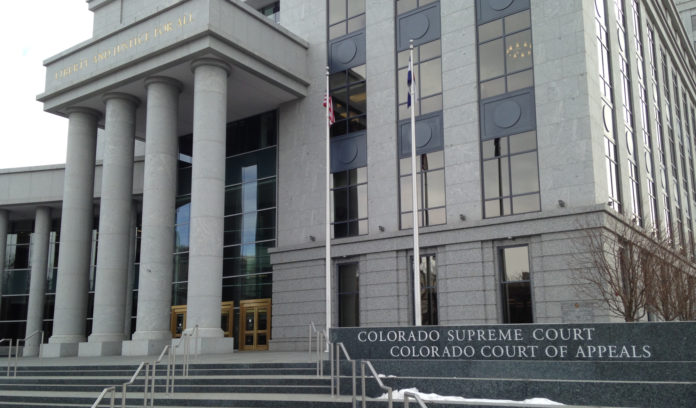
The Colorado Commission on Judicial Discipline on Aug. 3 released its annual report detailing disciplinary actions taken against Colorado judges and the number and nature of judicial misconduct complaints it received in 2020.
The reports offer a limited look into the commission’s mostly confidential proceedings. The Colorado Constitution requires the commission to keep complaints confidential unless and until the commission files recommendations for public sanctions with the Supreme Court. The secretive process has drawn scrutiny in the wake of allegations of widespread sexual harassment and judicial misconduct within the Judicial Branch.
The CCJD received 199 complaints in 2020, a typical number in recent years. Of those, only 73 alleged ethics violations by a judge. The vast majority of complaints received each year are dismissed as non-meritorious. More than 20 of the complaints targeted attorneys, law enforcement, probation officers and others outside of the commission’s jurisdiction. Many other complaints are directed at judges but express dissatisfaction with the outcome of a case, rather than allegations of ethics violations.
Colorado is not unique in this regard. According to the Center for Judicial Ethics at the National Center for State Courts, more than 90% of grievances filed by the public with judicial conduct commissions nationwide are dismissed without a formal complaint or full investigation by the commission. As in Colorado, complaints are often dismissed because they target people or matters beyond the scope of the commissions’ authority.
In 2020, complaints were filed against judges in all but one of the state’s 22 judicial districts. Four complaints were filed against Court of Appeals judges, and none were filed against justices of the Colorado Supreme Court.
Two judges were publicly censured in 2020. In one case carried over from 2019, Weld County District Judge Ryan Kamada was disciplined for violations of a half dozen judicial canons, including rules requiring judges to comply with the law and promote public confidence in the judiciary.
While serving as a judge and magistrate, Kamada disclosed confidential information about pending cases to third parties. In 2019, Kamada warned a friend to stay away from a mutual acquaintance who was wanted for drug-related crimes. Kamada’s friend subsequently tipped off the acquaintance and disrupted an investigation by the Weld County Drug Task Force. Kamada pleaded guilty to obstructing a federal task force investigation. On July 29, he was sentenced to a year and one day in prison.
The CCJD also publicly disciplined part-time Baca County Judge Debra Gunkel. She was convicted in 2020 of driving under the influence of alcohol in Kansas, which violated the terms of her probation and deferred sentence for an earlier DUI she committed in Colorado. Gunkel resigned in March and accepted public censure for violating the law, failing to promote confidence in the judiciary and abuse of the prestige of judicial office.
Three judges were privately disciplined. One judge was issued a private reprimand for conduct with staff in the courthouse that adversely affected the work environment. Another judge received a private reprimand for a nearly three-year delay in issuing a decision in a “complex and highly contentious” case. The third judge was issued a private reprimand for “insensitivity in using racial and ethnic terms.” The same judge was also given a private admonishment for “an appearance of impropriety” regarding the judge’s handling of administrative duties.
A total of 37 complaints involved bias, prejudice or lack of impartiality, one of the most common categories of complaint. Three complaints alleged racial, gender, transgender or religious discrimination, down slightly from five in 2019.
A handful of high-profile cases involving Colorado judges who made racist comments have drawn attention to the lack of diversity on the bench and judicial officers’ handling of racial issues. Former Court of Appeals Judge Laurie Booras resigned in early 2019 after the CCJD recommended she be removed from office due to her racist remarks about a colleague. More recently, former Arapahoe County District Court Judge Natalie Chase resigned and was publicly censured for using racial slurs and declaring that “all lives matter” while sitting on the bench in the presence of Black court employees.
Five complaints in 2020 alleged “administrative issues” and harassment involving colleagues or staff, the same number as last year. Earlier this year, the Denver Post exposed allegations of widespread sexual harassment within the Judicial Branch, and several alleged instances of misconduct were detailed in a memo released by the Colorado Supreme Court in February.
In the wake of the revelations, the CCJD sought to clarify its role and what it knew of the allegations. According to a Feb. 12 news release from the commission, a review of records from the past five years failed to yield a referral from the SCAO or office of the Chief Justice that matches the “limited details reported publicly” about allegations of sexual harassment and discrimination detailed in the memo.
According to CCJD Executive Director William Campbell, complaints from court staff about a judge’s conduct may come to the commission directly or may be referred through human resources staff from the State Court Administrator’s Office. Campbell said in February that the lack of referrals resembling the allegations in the Supreme Court memo was “puzzling.”
“The HR people have always been very cooperative,” Campbell told Law Week. “And we’ve had every reason to believe that if they found something that needed attention, they would refer it to us.” He added that some of the alleged misconduct by judges might be “purely administrative” in nature, placing it outside the scope of the commission.
The COVID-19 pandemic also left its mark on the types of complaints received. Two of the complaints received in 2020 were categorized as “COVID issues.” Pandemic-related delays in trials and hearings led to some complaints, Campbell told Law Week earlier this year, and dissatisfaction with audio and video proceedings also generated complaints.

